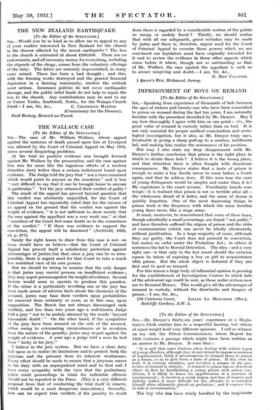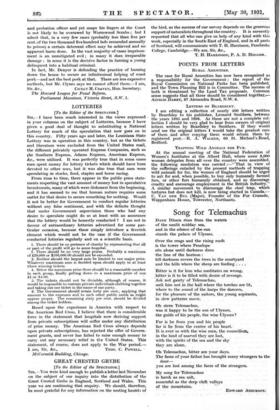[To the Editor of the SPECTATOR.] SIR,—Mr. Denyer's thirty-six years'
experience as a Magis- trate's Clerk entitles him to a respectful hearing, but others of equal weight hold very different opinions. I call as witness on my side the Prison Commissioners, whose Report for 1928 contains a passage which might have been written as an answer to. Mr. Denyer. It runs thus : " It is said that some Justices when dealing with certain types of young offenders, although they do not intend to impose a sentence of imprisonment, think it advantageous to remand them to prison as a lesson, so as to give them a taste of prison. If this view be held, it is entirely mistaken, and involves a misuse of the pro- cedure of remand in custody. A remand to prison has no deterrent effect—in fact by familiarizing a young person with prison con- ditions, it is likely to lessen his apprehension of a sentence of imprisonment ; it involves a social stigma and loss of respect and thereby makes it more difficult for the offender to re-establish himself when ultimately placed on probation : and it exposes him to risk of contamination."
The boy who has been wisely handled by the magistrate and probation officer and yet snaps his fingers at the Court is not likely to be overawed by Wormwood Scrubs ; but I admit that, in a very few cases (probably less than five per cent. of the two thousand five hundred lads remanded annually to prison) a certain deterrent effect may be achieved and no apparent harm done. In the vast majority of cases imprison- ment is an unmitigated evil ; in many it does irreparable damage ; in some it is the decisive factor in turning a young delinquent into a habitual criminal.
In fact, Mr. Denyer is defending the practice of burning down the house to secure an infinitesimal helping of roast pork—and not the best pork at that. There are less expensive methods, but Mr. Clynes says we cannot afford them.—I am,







































 Previous page
Previous page